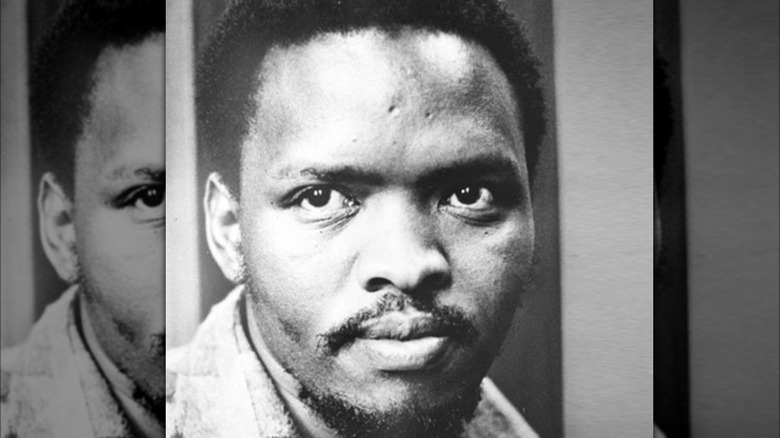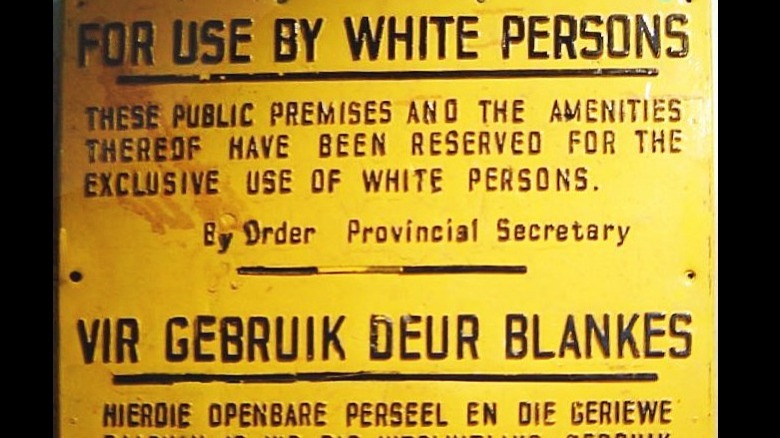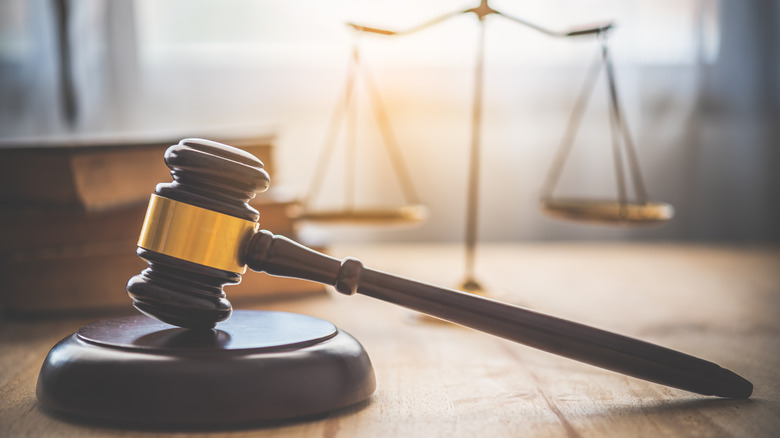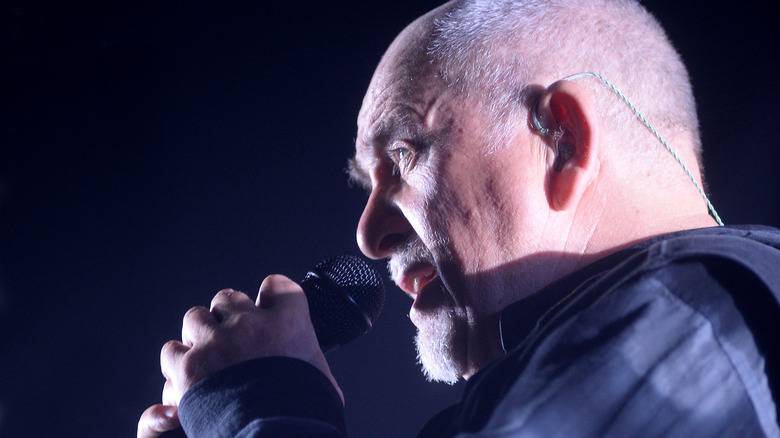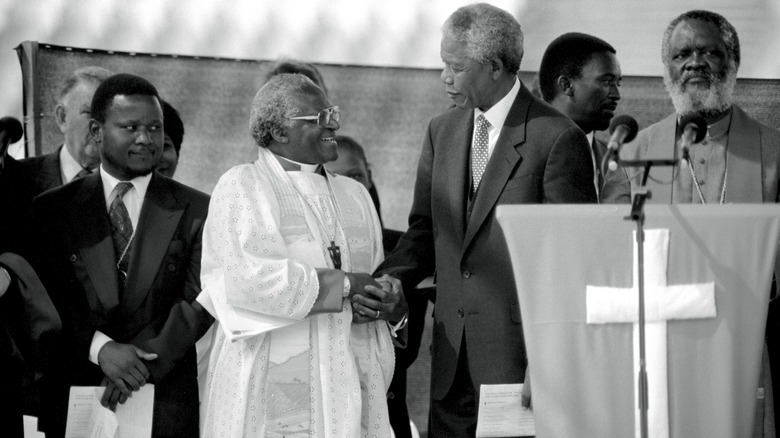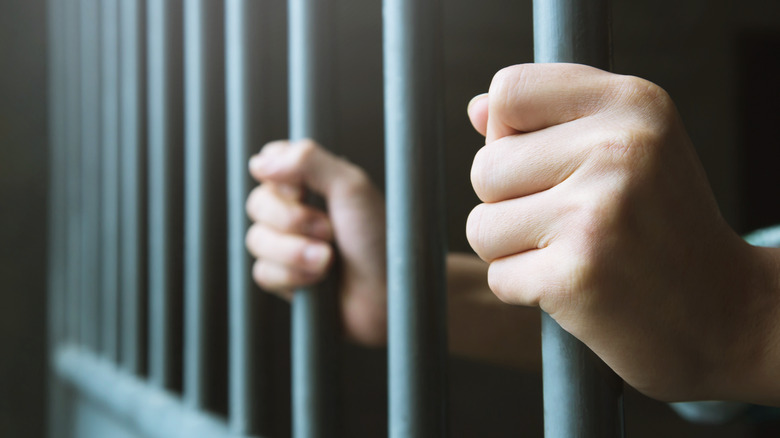How The Murder Of South African Activist Steve Biko Was Hidden For 20 Years
On September 12, 1977, when one of South Africa's most important Black activists, Bantu Stephen "Steve" Biko, died from traumatic brain injuries, he had been in police custody for three weeks (via Jet). Biko, an outspoken critic of apartheid, had been chained naked to a grill, beaten, and tortured before being driven more than 700 miles to another prison without medical care, where he succumbed to his injuries, according to AP Archive.
Beginning in 1948, when the National Party came to power, the racist and segregationist policies that had already been in place in South Africa were codified under apartheid, according to Britannica. The government controlled where non-whites could live and work and who they could marry and banned them from voting, among other restrictions. The backlash from Biko's brutal murder helped topple the white minority government that had ruled over South Africa's non-white majority, per South African History Online. But the truth behind Biko's killing took 20 years to be revealed.
The Police Coverup of Steve Biko's Murder
Steve Biko was born in 1946 in King William's Town, South Africa, and became politically active while still in high school, according to Britannica. While studying medicine at the University of Natal, Biko, a charismatic leader, helped found the South African Student Organization (SASO) and launched the Black Consciousness Movement, which empowered Blacks (per JSTOR Daily). As Biko rose to prominence, the government banned him from speaking publicly and from leaving the King's Town area, per Biography. On August 18, 1977, the police arrested him on terrorism charges, according to the Zinn Education Project.
Jimmy Kruger, South Africa's Minister of Justice and Police, told the press Biko had died due to a seven-day hunger strike, an explanation that Biko's family — who had been present for the post-mortem examination — didn't believe (via South African History Online). Several newspapers also began questioning this explanation, especially the Daily Dispatch, whose editor, Donald Woods, was a friend of Biko's, per Time. Biko had been the 20th person to die in police custody in 18 months, per South African History Online.
Funeral and Inquest
Steve Biko's death led to unrest among South Africa's Black population, including protests in which the police killed several students and a growing outcry from outside the country to investigate the circumstances of his demise (per JSTOR Daily). Somewhere between 20,000 and 30,000 people attended Biko's funeral on September 25, 1977, in his hometown. It included dignitaries from other African countries and the West, as well as a speech from the Reverend Desmond Tutu, who would later receive the Nobel Peace Prize (via News 24). In October, the U.S. Congress called for a probe into Biko's death and South Africa's police procedures, per "South Africa: Overcoming Apartheid, Building Democracy."
The apartheid government finally buckled and held a formal inquest that November. But if anyone thought the truth about Biko's death would come out or the police would be held responsible for his murder, they were wrong. Although the inquest revealed Biko had suffered catastrophic brain injuries while in custody, the court found no wrongdoing or criminal activity by police, per "Tackling the Question of Legitimacy in Transitional Justice." The presiding judge also refused to call Justice Minister Jimmy Kruger to be questioned about a potential cover-up, according to UPI.
Backlash Over Biko's Murder Helped End Apartheid
The obvious government cover-up of Steve Biko's murder and the do-nothing inquest, along with the continued crackdown on Black organizations and the press, helped escalate the international backlash against the ruling party. Western governments — including the U.S., which had been supportive of South Africa — signed on to a United Nations Security Council resolution to ban arm sales to the country, per "South Africa: Overcoming Apartheid, Building Democracy." South Africa's apartheid government was becoming a pariah.
Beyond this, Biko's death and the other horrors Blacks were experiencing under apartheid quickly seeped into the world's conscience through art. In 1980, Peter Gabriel's song "Biko" became an international hit (per "Tackling the Question of Legitimacy in Transitional Justice"), and the 1987 Richard Attenborough film "Cry Freedom" starring Denzel Washington helped cement the international stance against apartheid. By 1994, the National Party's rule was done, apartheid was gone, and Nelson Mandela — who had been a political prisoner for 27 years — had been elected president, per History. Soon the world would have proof the police had murdered Biko.
The Truth and Reconciliation Commission
Not long after Nelson Mandela came to power in 1994, the new government created a Truth and Reconciliation Commission chaired by Archbishop Desmond Tutu that was meant to heal the deep wounds apartheid had created for both Blacks and whites and promised amnesty to anyone who confessed their human-rights violations as long as they had been acting on political motives (per "Tackling the Question of Legitimacy in Transitional Justice"). Steve Biko's family was strongly against the commission from the start, fearing that their loved-one's killers would escape justice for their crimes, per Southern African Digital History Journal.
In 1997, five former police officers came before the commission and confessed to killing Steve Biko. Harold Snyman, a colonel who headed up Biko's interrogation; Gideon Nieuwoudt; Daantjie Siebert, a captain; Ruben Marx; and Johan Beneke claimed they didn't intend to murder Biko but that he fell into a wall during "a scuffle" with the officers, per Southern African Digital History Journal. Nieuwoudt, a detective sergeant at the time, admitted beating Biko with a rubber hose during an interrogation, per The Washington Post. Two years later, in 1999, the commission denied all five officers amnesty because the men had lied on the stand and the crime didn't have a political motive, according to History.
What Happened to the Police Officers Who Murdered Biko?
As Steve Biko's family had worried, the five former police officers were never prosecuted for murdering Steve Biko because of a lack of evidence, according to "Tackling the Question of Legitimacy in Transitional Justice." Gideon Nieuwoudt later died of cancer while in prison for murdering three other anti-apartheid activists in 1985, three Black police officers in 1989, and various other crimes committed while he was a police officer, per The Washington Post.
Back in 1979, Biko's family received $78,000 U.S. from the apartheid government. Biko's widow, Nontsikelelo Biko, referred to it as "blood money" and an "admission of guilt" concerning her husband's death, per "Tackling the Question of Legitimacy in Transitional Justice." The government admitted no wrongdoing at the time and said that the payment closed the case on Biko's death. "As far as we are concerned it is only the beginning," Nontsikelelo Biko told The Washington Post in 1979. "The Black people of South Africa will not rest until such time as we get to know how Steve Biko came to meet his untimely death." Her words proved to be true. Today, the life of Steve Biko continues to inspire the world, and his death remains a bloody reminder of racist policies that must never be repeated.
